While singing the jingle bell, the end of the year is approaching. It is again a happy time for family and friends to gather together to share the fruitful year. You will meet many people and families. One friend recently asked me, “we are going to have dinner with a family with disabled children. How to talk to their parents? Shall we ask about the disability or ignore the topic and act like everything is normal? What shall we prepare? “We want to discuss all the questions in this article “talking to parents with disabled children” and hope it helps you and your family.
Related Reading:
- STOP Giving Me Compassion! 7 Tips on Talking to Parents with Disabled Kids
- 12 Things can Help Raise Kids with Diversity and Inclusion in Mind
- 10 Ways to Be an Upstanders in Bullying
- 8 Type of Intelligence – Every Kid is Gifted
- How to Stop Kids from Chewing Their Shirt
- 5 Life-Changing Lessons by Parenting Autism Kids
- What to Do When Family Members Hurt You
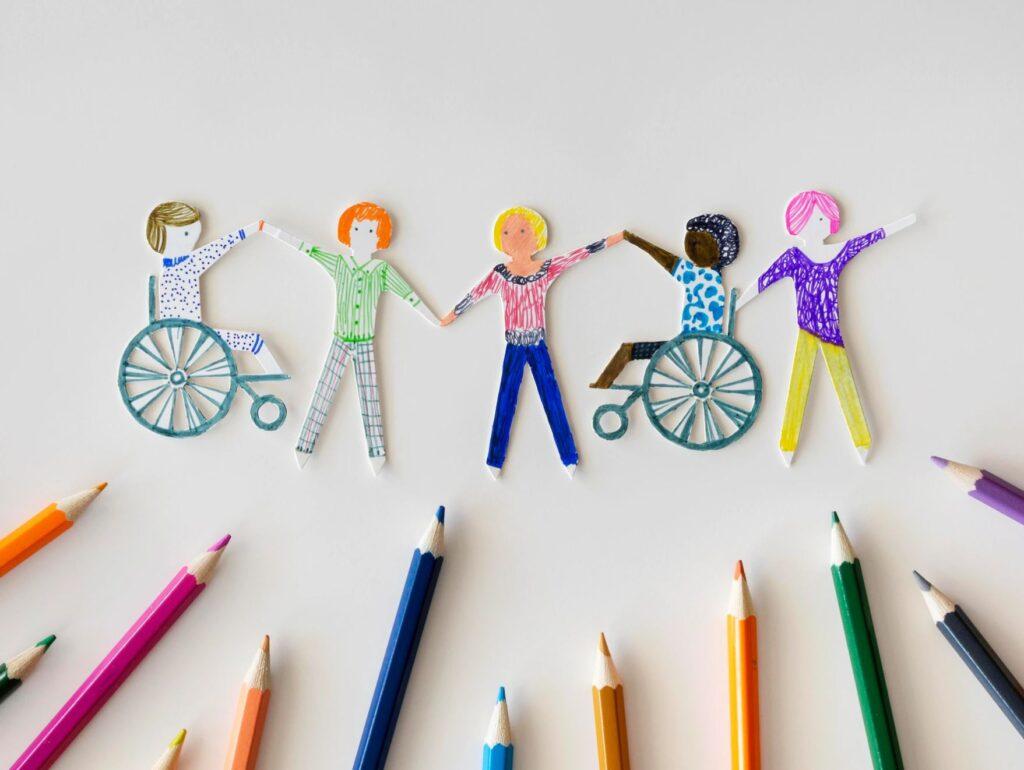
Table of Contents
Facts about Children’s Disabilities
Children’s disabilities are a group of conditions due to physical, learning, language, or behavioral impairment. It can begin very young and impact day-to-day functioning, usually lasting throughout a person’s lifetime. It occurs among all racial, ethnic, and socioeconomic groups. According to CDC, one in six children aged 3 through 17 years has one or more developmental disabilities in the U.S., such as:
- ADHD,
- autism spectrum disorder,
- cerebral palsy,
- hearing loss,
- intellectual disability,
- learning disability,
- vision impairment, etc

What Causes the Children’s Developmental Disabilities?
Most disabilities are caused by combination of factors, including genetic, parental health, and behaviors (e.g., smoking and drinking) during pregnancy, birth process (complications), infections during pregnancy and infant period, and exposure to high environmental toxins, such as lead. There is no particular reason to conclude developmental disability, and it is not the parent’s fault for causing the disability.

What Support do Parents Need?
All papas and mamas need a break from time to time, especially disabled families. They are already struggling with the doctor’s appointments and follow-up treatment plan, running daily school activities, and managing housework and their job. Moreover, they may find it hard to accept the disability, feel guilt, and blame themselves for causing the situation.
They are constantly vigilant, listening in the other room to ensure no meltdown. When entering a new environment, they scan surroundings to ensure no one is approaching to say something unkind. The financial situation is also a significant concern. Parents of disabled children are constantly haggling with insurance companies, mounting bills, and high medical costs for critical care. Caring for disabled children can also put marriage more vulnerable due to the extra stress.
Parenting a disabled child can feel like an isolating and overwhelming experience. They will need physical help and mental and emotional support.
- Physical Help
- Babysitting that they can go for a date night
- Bringing them a cooked meal
- Offering the children a lift to school
- Cutting the lawn
- Mental and Emotional Support
- Create some fun moment for your friend
- Schedule playdate for their kids and yours
- Treat them and their kids as normal, do not focus on the disabilities but on the abilities
- Create friendly and safe environment for the disabled kids
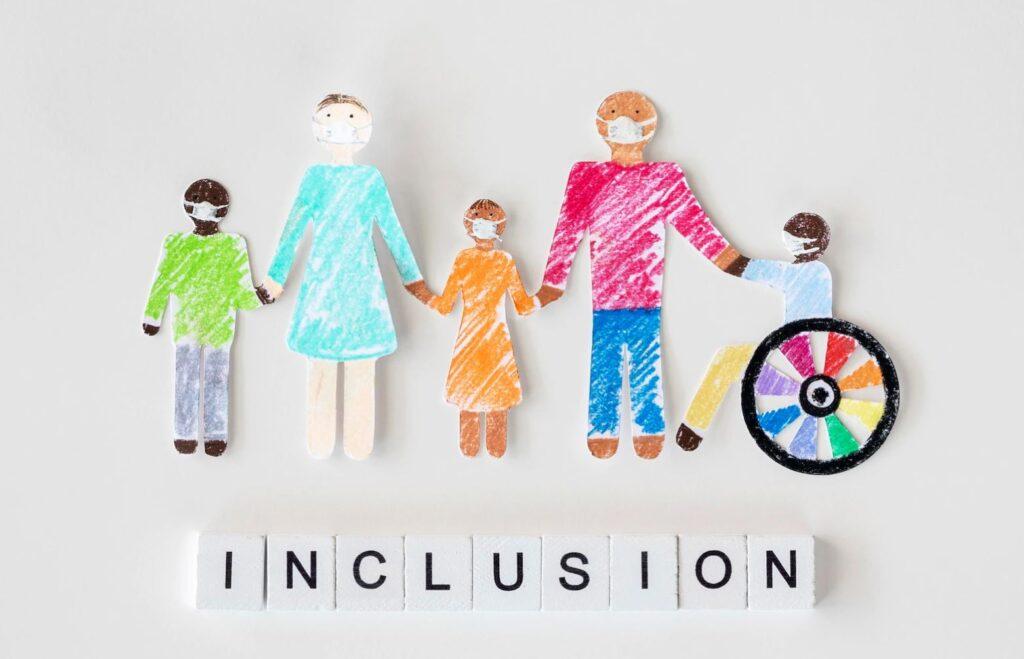
You can Say The Following
Many people lose words when they learn of a child’s diagnosis, such as a learning disability, a physical disability, or a chronic condition. People frequently need to say something they believe to be compassionate and uplifting. But it isn’t. Even when people mean well, saying certain things can leave parents of special-needs children frustrated, angry, and isolated.
Unfortunately, that something may be hurtful to both the parent and child. Each child’s diagnosis is different, and each parent will respond differently to the news that her child has a particular need. As a general rule, treat people with disabilities the way you’d like to be treated: politely, respectfully, and with interest.

1. Be Kind & Sincere
Related Reading:
- 18 Type of Intelligence – Every Kid is Gifted
- Prevent Kids from Bullying: A Complete Guide for Young Schoolers’ Parents (5 to 8 years)
- 10 Ways to Be an Upstanders in Bullying
- The Most Complete Fun and Interactive Hand Games For Kids
The child’s parent likely knows everyone is staring and is looking for people who accept them and be interested in making them feel normal. The attitude toward families with disabled children showed them love, friendship, and support. Rather than a quick greeting, look at disabled children in the eyes or hold her hand to create a connection.

2. How Are You Doing?
Many people notice, stare, and then walk away. Begin talking as you would with any other parent; introduce yourself, offer a smile, ask about her child’s age, and make a nice comment about their children. Be sure to talk to the disabled children same as you would talk to any “typical” child. It may be difficult because you are worried about saying the wrong thing, but it will soon become second nature. Everyone likes to talk and share their feelings.
The typical opening are:
Hello, How are you doing? Have you found it hard to find parking spots?”
How is your day at school?
Tell me about your friends or hobbies.
Have you travelled recently?
3. Don’t Avoid the Topic
It is OK to ask questions when it’s coming from a caring heart. Begin by saying, “If you don’t mind me asking.” Some parents may, while others may not. In any case, it is her decision whether or not to discuss her child’s condition.
If you do not mind me asking, what is her / his diagnose? What does it mean to him/her?
How is her physical therapy is going? What should I do if you ever have a shutdown while I’m around?
4. Demonstrate Your Help and Support
Even if you are not the parents with disabled children, there are ways you can be helpful and supportive. For example: ask if you can babysit while the parents run errands, go on a date, or spend time with another child. Your ongoing assistance and support are greatly appreciated.
Repeat help and be consistent. Put this family on your to-do list to call once a month so you don’t forget.
May I do something to help? Can I bring you dinner once per month? or Shall I watch your children while you are getting the groceries?
I am here to listen and help
5. Show Compassion Rather than Pity
Parents with disabled children don’t want anyone feeling sorry for them and they certainly don’t feel sorry for themselves. Many people treat people with disabilities as if they are children. However, many disabled people can be hurt or irritated. Communicate with them in an age-appropriate manner. Rephrase what you said and display it a little slower if necessary.
Typical questions can be:
“I know it is very challenging, but you must be so proud of your son.”
6. Learn about the Child’s Disability
Learning about the disability is a great help. You don’t have to be an expert, only a little knowledge can help everyone. For instance, learning sign language to communicate with a deaf child, knowing how to react in an emergency. Therefore parents with disabled kids can rely on you when you are together with their kids.
I’d like to know how I can assist you. I’d like to learn more about special needs.
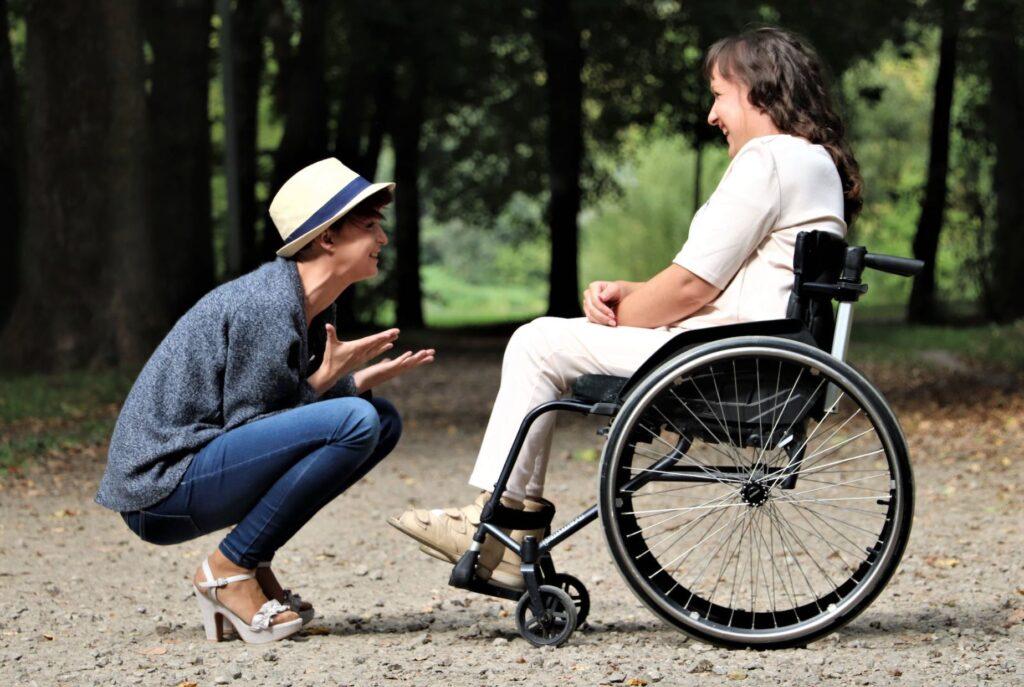
7. Be Inclusive
While some disabilities prevent a child from participating in certain activities, they can still participate in many others. Invite disabled children and their families to your events, whether it’s a playground playdate, a birthday party, or a weekend outing.
Include them in conversations and activities and make adjustments so they can be applied. Pass the ball to them during games, and pay attention if they are confused or endangering themselves.
When you are talking with kids in wheelchair, sit down to keep everyone at the same eye level. If they cannot see, avoid using amusing facial expressions or mimes. If you’re discussing something entertaining or interesting, give a brief description so that no one is left out.

8. Educate Your Children and Encourage Friendship
Every parent desires for their children to thrive, make friends, and live happy lives, same for disabled children’s parents. Taking the time to educate your children about the disability of another child is a fantastic idea that will help to raise awareness of inclusion.
Your child may be unaware of the situation and how the disability works, but by discussing it with them, you can help them understand. Increasing children’s awareness goes a long way toward fostering friendships and will assist your child in learning to play with a child with special needs and offer assistance, companionship, and empathy. You may be not used to spending time with people who are disabled. As you become more acquainted with them, you will grow accustomed to them and feel more at ease around people who are different from you.
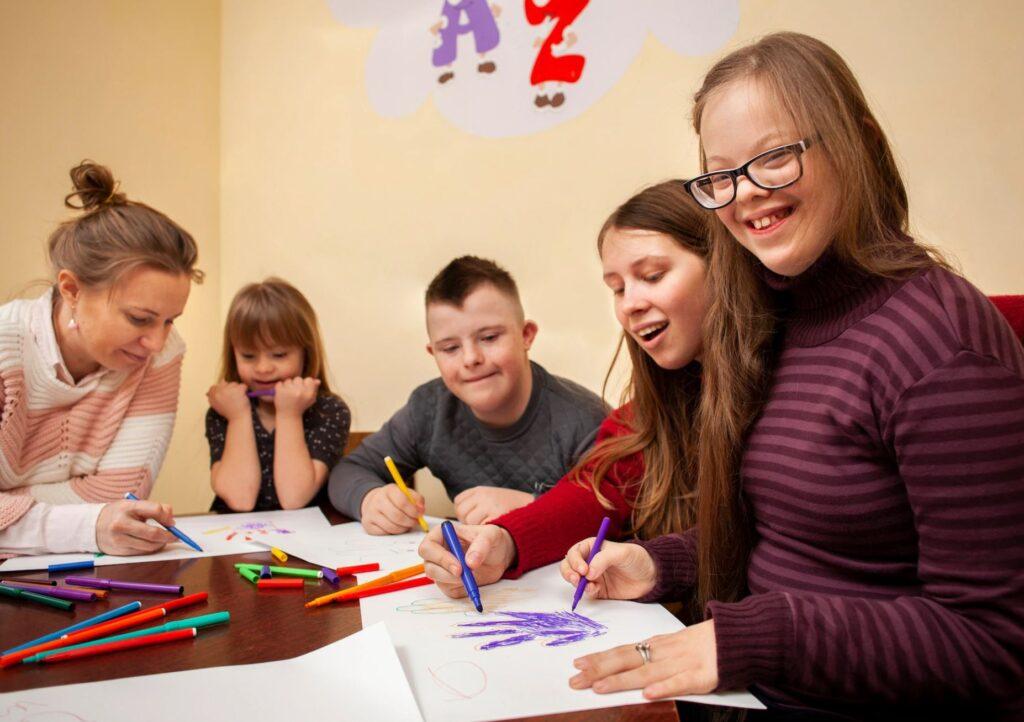
9. Treat Parents as Normal Friends and Extend Grace If They are Late or not Show Up
Just because they have a disabled child doesn’t mean they have different interests. They don’t have different interests just because they have a disabled child. Talk to them about things other than their disabled child. On weekends, invite them out for a drink or lunch. They may not always be available, but they will certainly appreciate the offer.
However, due to unforeseen circumstances, they may be late or cancel your invitations. Their lives are decided on a daily or hourly basis. A medical emergency, being awake all night, or having an epic meltdown ten minutes before leaving the house, etc.
Related Reading:
- 9 Way to Help Stay at Home Mom Depression
- 12 Things can Help Raise Kids with Diversity and Inclusion in Mind
- 10 Steps to Avoid Overshopping – Shopping in a Pragmatic Way
- Creative Things to Draw with Chalk
- Room Parent Feedback – Parents Involvement in Primary School

10. Encourage without giving advice or passing judgment.
Raising a disabled child required the same strength and determination as a marathon athlete in the Olympics. Encourage your friend by telling them how much you admire their qualities. Tell her she’s doing a good job and that you agree with her decisions. Do not inquire, “Have you tried ABC?” This could send the message that there is more this mother could be doing. She is exhausted after attempting so many things.
“I admire your dedication to providing for, caring for, and advocating for your child’s needs. I see you facing a challenge after fighting for a better life for your children. The process is tiring, you tried so much but never give up. I am inspired by your love and determination.”
“I hope everything went well” or “It’s like a full-time job with everything you do with your son every day! That sounds like a difficult decision. How are you holding up?”
11. Compliment their Children
“What a cute dress your daughter is wearing,” or “I love your son’s new haircut,” or “What lovely manners your little ones have,” all parents enjoy hearing from their children. “Your son has such a beautiful singing voice.” “I had no idea he was having those difficulties. He looks fantastic.” “You guys must have worked hard because he looks awesome!” may be preferable to many parents.
12. Ask for medical treatment
To be clear, children do not grow out of disabilities or medical conditions. Most parents have had to let it go of denial and accept fact, but that doesn’t mean it isn’t difficult or sad.
“How is he doing these days?”
or “What has he been working on in therapy recently?”
or “What new skills has he recently acquired?”
“I know another autistic child who is obsessed with trains. “What is your son up to?”
13. Remain calm if they are having difficulty
Don’t be alarmed if they have sensory overload. Ask, “How can I assist you?” and let them tell you what they require (if anything).
A person experiencing sensory overload may be unable to speak or advocate for themselves. Determine whether they can write, sign, or type. Don’t force it if they don’t want it.
Do Not Say
As a general rule, treat people with disabilities the way you’d like to be treated: polite, respectful, and interested. Staring, saying nothing, and walking away is one of the most repulsive things you can do to someone with a disability. Many people will not even acknowledge someone with a disability, whether it’s a waiter in a restaurant or a stranger on the street, instead preferring to address the person they’re with. Don’t be afraid to approach them directly.

When conversing with someone who has a disability, there are a few rookie mistakes (and assumptions) that people make.
1. God Never Gives Us that We Cannot Handle.
The truth is that unexpected and often devastating events occur, such as learning about your child’s disability. Many people struggle with it, especially at first, and many children suffer. Finally, the parents “have to” deal with it.

2. I’m not sure how you do it.
Parents of special-needs children are like any other parents, doing their best for their children. They are not special and doing their best and wasn’t chosen for this position. Telling parents of disabled children incredible reinforces that their child’s condition is bad and sorry that that only “super” parents can handle.
3. She’ll Get Over It / Grow Out of It
You are not a doctor and don’t downplay the diagnosis. Autistic children have more than just behavioral issues. Children who are nonverbal are more than just shy. Children who have trouble eating are not picky. These are kids doing their best, and these are parents trying to help their kids overcome obstacles. To be clear, children do not grow out of disabilities or medical conditions. Most parents have had to let go of denial and accept this fact, but that doesn’t mean it isn’t difficult or sad. “How is he doing these days?” or “What has he recently worked on in therapy?” or “What new skills has he recently learned?”
4. Were You Aware While Pregnant?
This may appear to be an unrelated question, but it implies that if they knew while pregnant, they will choose abortion over bringing my child into this world. It’s not just hurtful; it’s also insulting, as if my child’s life is meaningless.
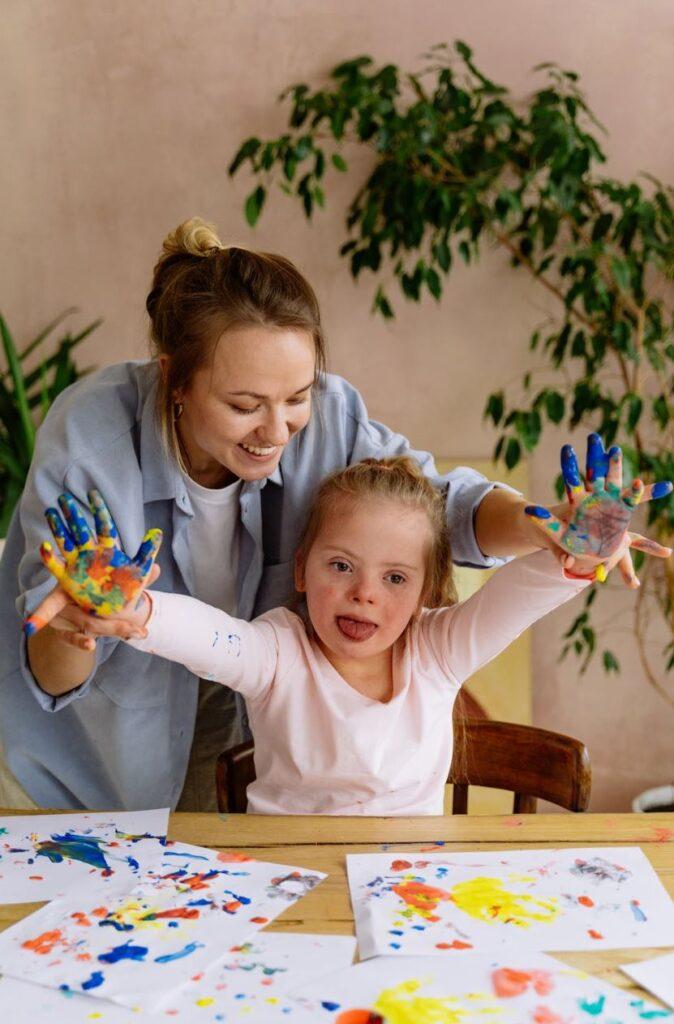
5. I’m Sorry to Hear That
Having a special needs child is not a tragedy, and it is not something you should be sad about as long as the kids are in good hands and alive, well, and content.
6. She Appearances to Be Healthy/Normal
Yes, some disabled children resemble “typical” children. However, these children face challenges that others either overlook or dismiss as a discipline issue.
7. Let Me Handle that for You.
Everyone could use a little assistance now and then. While you may want to make things easier for someone with a disability, however you must also respect their space and independence. Offering to assist but not taking over is a good strategy. As adults, we are constantly working to help our children become self-sufficient, either disabled or non-disabled children. We must make space and provide support for all children to learn and experiment on their own. It’s fine to offer assistance when a child is struggling, but don’t assume that because they have a disability, they can’t do something on their own.
8. You are So Inspiring. It’s So Good to See You Out!
People think that a disable person equals “stay at home” or “cannot work” anymore. If the disabled persons can live a normal and active social life like going to work, cooking dinner, have a drink with friends, and then watching TV, it is a bit over exaggerate that they feel they need praise for. But not just because they are going about their day. That’s not a compliment, even if you mean it that way.

9. Attitude is the only real disability.”
Attitude has a big impact but it won’t help a wheelchair user climb the stairs and won’t regulate the blood sugar of a child with Type 1 diabetes. The barriers people with disabilities face are real, and children with disabilities are navigating these barriers every single day.
10. Ignore them. Or shush your child when they ask questions.
Children are aware when they are being ignored, stared at, or discussed. And by silencing your child, you are telling them that they have something to be ashamed of. Children are typically straightforward, discussing topics that adults find uncomfortable. This is an excellent opportunity to demonstrate to your child that disability is a normal part of life.
11. Use the R-word or other ablest language/derogatory terms.
Many standard terms, including the R-word, should never be used. Children with special needs have many other unique abilities, and their disability is only a part of who they are. Make a point of noticing and discussing what they do well as well as how they are growing and changing.

Final Thoughts from Pragmatic Lifestyle
Hand-in-hand with kindness is also respect. With everyone having differing views on things, parenting included, it’s better to refrain from saying anything if you have nothing good to talk about. Parents with disabled kids already have lower self-esteem than typical kids, and they don’t need to hear more degrading remarks.
Keeping these in mind, let’s make this world a better and happier place for disabled kids and their parents.
About Me
Hi, there. I am Lin. Together with my husband and two kids, we live in the beautiful Netherlands in Europe. I am dedicated to self-development, creating quality time for the whole family, and fully supporting kids with their potentials and possibilities with all I have learned from engineering, MBA, and 10+ years of working experience in the energy sector.



4 Comments
Comments are closed.